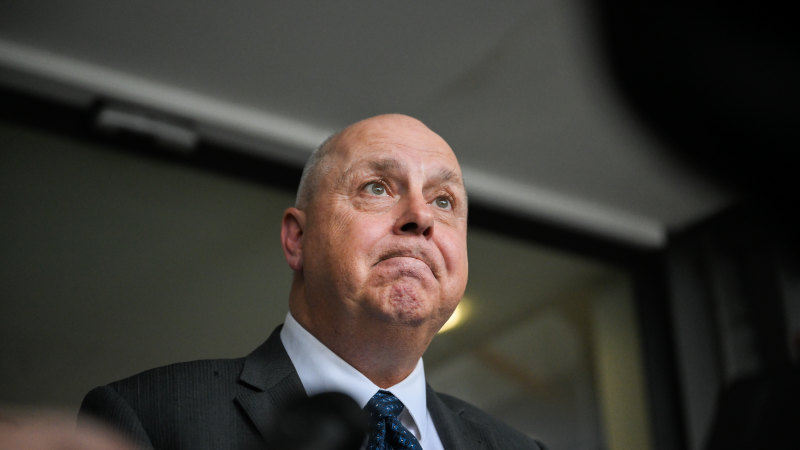Save articles for later
Add articles to your saved list and come back to them any time.
Victoria paid $4 billion in interest costs in the last financial year – about $600 per person – as strong employment and property taxes improved the state’s bottom line by $1.5 billion.
The Allan government on Friday released its final report into the state’s finances for the year ending June 2023, pointing to easing inflation, an improved economy and net debt of $115 billion.
Treasurer Tim Pallas has revealed Victoria paid $4 billion in interest costs over the last financial year.Credit: Joe Armao
The updated figures showed Victoria’s operating deficit was $8.8 billion by the end of the last financial year – $1.5 billion better than forecast in the May state budget.
This was largely a result of collecting an extra $521 million in stamp duty as home prices remained steady even though purchases slowed down. Land tax was up by $77 million.
Victoria’s unemployment rate of 3.7 per cent, which has since dropped to 3.5 per cent, also helped the Allan government collect an extra $241 million in payroll tax and an extra $30 million from its mental health levy.
Improved revenue meant Victoria’s net debt hit $115 billion, compared with the May forecast of $116 billion, and is now equivalent to 20.3 per cent of gross state product.
Although the interest bill on government debt was $97 million lower than expected, the figure hit $4 billion. This was a $1.1 billion increase compared to the previous financial year. By 2026-27, annual interest costs are expected to climb as high as $7.98 billion.
Rising interest rates have hit the government’s finances at the same time as it has needed to borrow to fund a range of major projects and other commitments and to pay off borrowings taken on during the COVID-19 pandemic.
Shadow treasurer Brad Rowswell said that Victorians “continue to be punished” for Labor’s financial mismanagement.
“On the back of last year’s greater than anticipated tax take, the Labor government is still set to introduce a new rent tax, holiday and tourism tax, health tax and schools tax,” he said. “And in her just in her first week as premier, Jacinta Allan has introduced two more property taxes.”
But Treasurer Tim Pallas said Victoria’s economy was strong given the state had the lowest unemployment rate in the country.
“Our fiscal plan is on track,” he said. “We’ll continue to invest in the future of Victorians, creating the homes, schools, hospitals and transport options that they deserve.”
Pallas shocked the property industry on Tuesday when he unexpectedly announced Victoria would expand its taxes on vacant and undeveloped properties in a bid to stamp out land banking and encourage development on vacant blocks.
The changes are expected to bring an extra $37 million into state coffers. They come after the May budget introduced a lower land tax threshold aimed at holiday homeowners, and hiked payroll tax obligations for large businesses as part of a plan to pay down Victoria’s COVID debt.
Friday’s figures noted that headline inflation in Melbourne averaged 6.9 per cent in the 2022-23 financial year. Wages increased by 3.4 per cent over the same period which, while well below inflation, represented the fastest rate of wages growth in more than a decade.
The Morning Edition newsletter is our guide to the day’s most important and interesting stories, analysis and insights. Sign up here.
Most Viewed in Politics
From our partners
Source: Read Full Article

